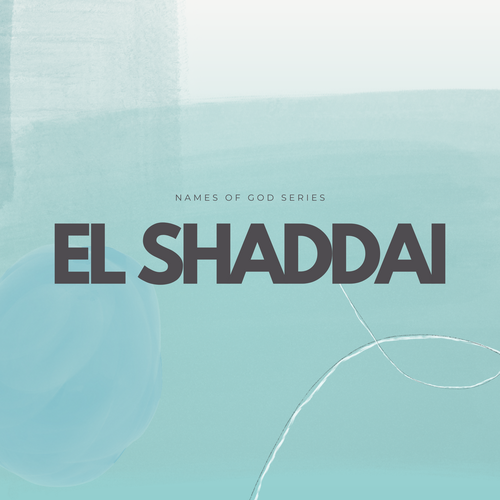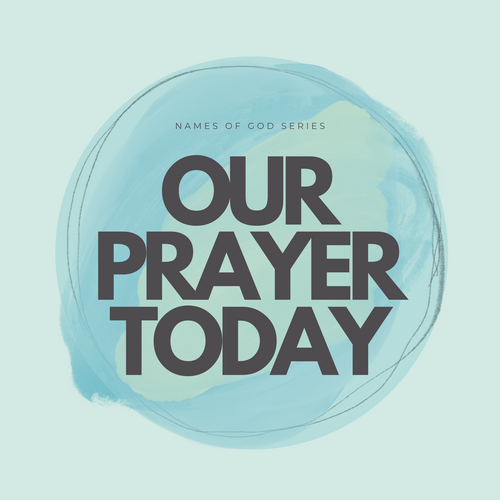God personally met with Abraham and brought him a new revelation of himself. He is El Shaddai. Our translations use the English name God Almighty for the Hebrew El Shaddai. God has waited a long time to bring this revelation to Abraham. He has waited so long that both Abraham and Sarah were past the natural age of child bearing. They could not even enlist a surrogate servant girl now. Romans 4:19-21 describes Abraham, “and without becoming weak in faith he contemplated his own body, now as good as dead since he was about a hundred years old and the deadness of Sarah’s womb. Yet with respect to the promise of God he did not waver in unbelief but grew strong in faith giving glory to God and being fully assured that what he had promised he was also able to perform.”
Abraham had an encounter with El Shaddai. Even though all the evidence, all the facts, everything he could see with his own eyes and knew from experience, screamed it is too late! It looked like God had waited too long, his promises could never be fulfilled. Yet against all of this hard evidence, Abraham believed El Shaddai. Romans 4:17 tells us something more about El Shaddai. He gives life to the dead and calls into being that which does not exist. El Shaddai is the God of the impossible and He is faithful.
Genesis 17:23 says that very same day when El Shaddai finished talking with him, Abraham had every male in his household, including himself at 99 years old, circumcised. Now that is obedience. That is trust. Every able male body was knocked out of commission, leaving the whole community totally vulnerable. That is the kind of obedience and trust that flow from our lives when we meet God as our El Shaddai.
What Does El Shaddai Mean?
Knowing God as El Shaddai was pivotal in the faith/walk of Abraham. Yet we are not certain of the exact meaning of this name for God although we have clues. We know the El, the Hebrew name that is translated God, means prominent, preeminent, to be in front, strong. The meaning of the Hebrew root for Shaddai is not totally clear. There are at least four concepts wrapped up in these Hebrew characters. Each one brings more meaning to the name El Shaddai.
The root for Shaddai is similar to the root in Hebrew for mountain. Mountains in the Bible connote might, strength and power. They are often the symbol for governments. They literally rule. El Shaddai has the last say, He rules.
Tying in with this concept, the root for Shaddai also has the suggestion that he is mighty and awesome, even terrible and fierce. El Shaddai is not a wimpy god who will back down and cower. He is God Almighty. He will accomplish His purposes.
A third concept brings a different connotation. The Hebrew word shad means breast. The idea is that God is the one who nourishes, comforts and gives strength and sustenance to his people. He meets their needs just as a nursing mother meets the needs of her child. Think of the words bountiful and sufficient when you think of El Shaddai. Think of a nursing baby who comes to his mother worked into a frenzy and then receives from her resources and is content and satisfied and rests securely.
Closely following this concept is the fourth connotation that comes from the Hebrew word shadha meaning to pour out or shed forth. The idea is that El Shaddai pours forth out of his bounty to meet our needs.
Psalm 91 give us a beautiful picture of El Shaddai and our relationship to Him. He who dwells in the shelter of the Most High God, El Elyon, will abide in the shadow of the Almighty, El Shaddai.
Abide means to stay with, to dwell with, to remain. We run to El Shaddai with our impossible situation and lean into Him, and stay with Him. We receive His strength, His equipping, His resources, His answers to our situation that is out of our control. Out of His bounty He pours forth.
Do you need to know El Shaddai today? Does all look lost? Do you face an impossible situation? Are you aware that you cannot fix the situation, you are not in control? Run to El Shaddai. He is faithful. He is strong and able. It is not too late. El Shaddai is the God of the impossible. He rules. Dwell, abide, remain in the shadow of El Shaddai
And join in the chorus with me, We will praise and lift you high, El Shaddai!

